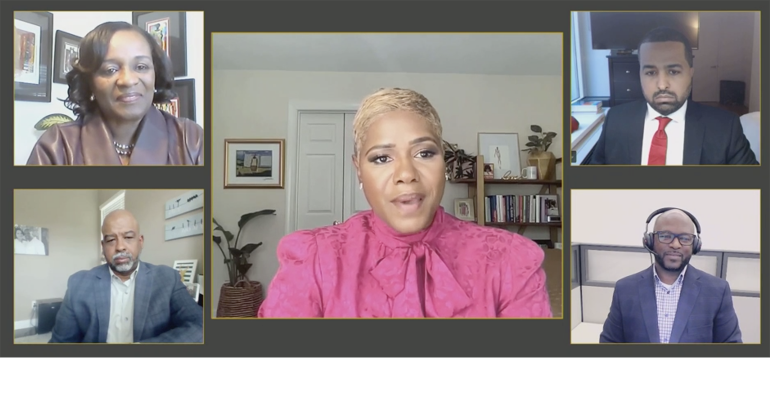With over 1,800 attendees, panelists representing the wealth management industry addressed systemic racism and its consequences for Black investors at the inaugural Black Wealth Summit, a three-day virtual event. Participants included speakers from Morgan Stanley, Raymond James, Charles Schwab, JPMorgan Chase and Bank of America, all of which addressed cultural and systemic factors they saw as obstacles to the generation of wealth by Black Americans, particularly intergenerational wealth.
Between sessions on Black wealth creation, event planners layered fireside chats on entrepreneurship, workshops on social media and education around behavioral finance alongside virtual networking opportunities. The event, which concludes on Friday, is billed as "an answer to making prosperity accessible to Black people, thereby making prosperity accessible to all people."
Cooperation, education, workplace empowerment and open conversation were all cited as keys to meaningful creation of Black wealth, according to panelists. A year ago, JPMorgan Chase committed $30 billion to a “racial equity program,” said Christopher Thompson, executive director and head of diversity, equity and inclusion at the firm. Black communities, whether they are one's own or others, need programs that are actionable, measurable and sustainable, he said.
The program, part of an initiative to combat “a tragic part of America’s history,” according to JPMorgan Chase CEO Jamie Dimon, provides funding for Black- and Latinx-owned business, home ownership in “underserved communities,” improves access to banking and brings attention to inclusivity in the firm’s own workforce.
The wealth management division at the firm has a goal of hiring 300 Black and Latinx advisors by 2025, said Thompson.
“This is about us transforming as a business,” he said. “The wealth business understands that we're not going to be able to transform our business unless we lean in and recruit and hire and train and develop new. We can't just keep trading advisors back and forth.”
But “diversity and inclusion” initiatives are not enough to solve the depth of systemic inequalities that have negatively impacted Black Americans, said Willie Wheat, senior banker at Charles Schwab Premier Bank. All employees at a firm are responsible for carrying out “discretionary efforts” to help Black communities. Bankers have a “direct seat” in correcting or perpetuating systemic problems.
Financial professionals should help their client build financial plans and budgets, he said, both of which are scalable, immediate methods for laying a foundation of generational wealth. Financial professionals should also be encouraging their clients to work at companies that allow for growth. “In the absence of a direct inheritance, which a lot of us are not privileged to get, a lot of our wealth comes from wages,” he said.
Bank of America recently raised its minimum wage for all U.S.-based employees, said Ebony Thomas, a racial equality and economic opportunity initiative program executive at the firm. “When we talk about, ‘How do we help support communities with wealth creation?’ part of that is starting with, ‘Do we pay our people a wage in which they can live within their communities and support their communities?’”
The financial services firm has also made investments in Historically Black College and Univerisities, she said.
“They've been vehicles to Black middle-class and Black creation of wealth,” she said. “We want them to be around for another 150 years. Investment in these institutions is critically important to ensuring that these institutions provide the right strategies, the right skills and the right support for students.”
As those students graduate and enter the workforce, new opportunities open up to support Black wealth creation. Morgan Stanley wants to “level the playing field” as Black Americans enter the workforce, giving those facing systemic racism opportunities that have historically been denied them, said Andy Saperstein, co-president of Morgan Stanley and head of the firm's wealth management division.
The firm has been vocal about its push into the workplace, as it grows its wealth management business. As it seeks to eliminate gaps between brokerage accounts and equity awards, it’s also aiming to grow its business alongside Black Americans “as their needs become more complex,” said Saperstein.
Another aspect addressed by panelists was the need for family-level conversations about goal setting and wealth building. Just as formal education creates the opportunity for wealth-building careers, advisors should be encouraging their clients to have dinner and breakfast conversations about wealth and financial education, said Pedro Suriel, vice president of diversity and inclusion at Raymond James.
“We have to be in it together with our clients,” he said. “As an organization, as advisors, we're more than providing financial advice. Sometimes we become counselors. Sometimes we become the trusted advisors of the individuals as they’re thinking about where they are in the various stages of life and what they need to accomplish those objectives and goals.”
“It goes back to educating our advisors and our clients about the resources that are out there,” he concluded. “Most importantly, giving them access to the tools and resources that they need to make informed decisions to live the life plan that they choose to.”





